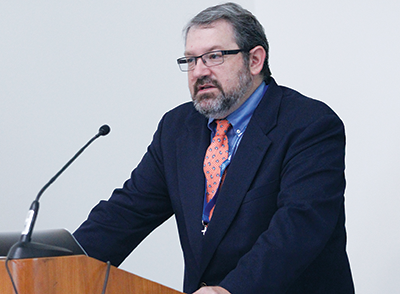NIMH Director Discusses His Vision for Institute

As part of his Year 1 listening tour, Joshua Gordon, M.D., Ph.D., the new director of the National Institute of Mental Health (NIMH), presented a special lecture in which he discussed the institute’s future funding outlook as well as his vision for its future—and what that might mean for psychiatry. His talk covered three broad areas: funding outlook, research priorities, and issues of interest to APA.
Budget and Research Funding
While Gordon’s replacement of Thomas Insel, M.D., shortly preceded another major transition at the level of the U.S. president, he reported that there has not been a significant funding shake-up. For 2017, NIMH received an $80 million boost in funding, $38 million of which is designated to the BRAIN (Brain Research through Advancing Innovative Neurotechnologies) Initiative. He also noted that supporters of the National Institutes of Health (NIH) in Congress have indicated that they hope to continue improving the NIH budget in the coming years so it can catch up with inflation.
Gordon also cited the positive developments of the 21st Century Cures Act—signed by President Obama as one of his last official acts of his presidency. As part of the law, two important projects of NIMH relevance—the BRAIN Initiative and the Precision Medicine Initiative (PMI)—had additional funding secured through 2026.
Research Priorities
It might be an obvious statement, but Gordon emphasized that his most important criteria for NIMH research was excellent science. Issues such as whether a project is risky and might fail or that it might refute existing dogma will not be major obstacles if the underlying science is good, he said. Also, NIMH wants to make sure all clinical studies are adequately powered. Researchers may try to save money to improve their grant success, but he would rather spend $1 million for a study whose results can be trusted versus $500,000 only to find out a lack of power means starting all over.
Gordon then talked about diversity in research. Part of his discussion referred to classic goals like diversity in the workforce, study participants, and subject matter, but Gordon emphasized that NIMH is seeking diversity within different time frames. For a given problem, he wants short-, mid-, and long-term goals.
Using suicide prevention as an example, he cited research on universal screening of patients in the emergency department as a short-term goal that can improve outcomes now. At the mid-level would be research on how neural circuit dysfunction correlates with suicidal behaviors, which might lead to improved therapies in a few years. And a long-term goal is investments in computational psychiatry, combining big data and neuroimaging to eventually change how at-risk individuals are identified.
Of Interest to APA
Gordon touched on two initiatives of interest to APA, one of which is tied to the question of how diagnoses are formulated—the Research Domain Criteria (RDoC). Gordon believes a rethinking of the mental health diagnostic system is warranted, but he acknowledged that the RDoC implementation has several problems. The RDoC initiative was carried out in a top-down manner, with experts deciding what constitutes a “domain of mental behavior.”
He hopes to shift RDoC to be a bottom-up, data-driven project. That would be an expensive endeavor as it needs a tremendous sample size, but he noted that the PMI will include a project called “All of Us,” which will collect biological and clinical data from one million Americans.
The other notable item was NIMH’s Experimental Therapeutics Approach. As Gordon explained, NIMH will no longer fund a study if it only compares two treatments and asks if one of the two treatment groups has better outcomes. All trials need to have proof-of-target engagement in humans before commencing; an experimental drug, for example, needs evidence that it alters receptor activity, while a neuromodulation device has to show how circuits are altered. The goal is that regardless of the outcome of a trial, value will be added to the existing body of knowledge. He acknowledged that clinical-trial specialists may not be well versed in receptor biology, so this new era will require more collaboration.
(Image: David Hathcox)
|
|
|
|
|


